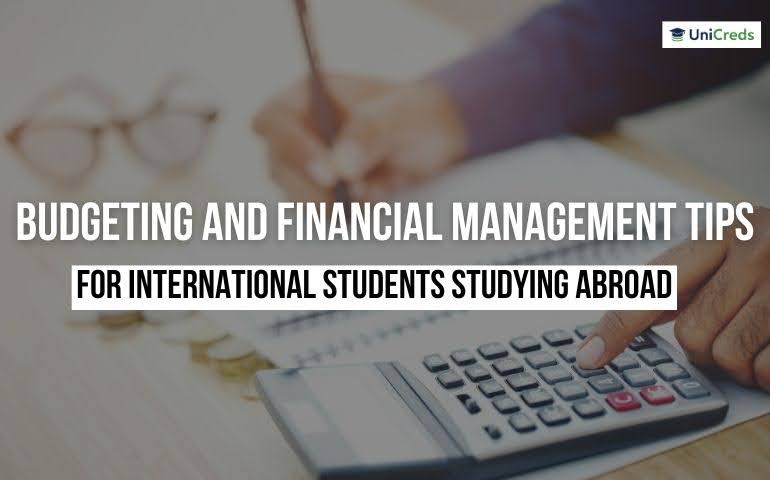Table of Contents
Studying abroad is an exciting opportunity that opens doors to world-class education, cultural experiences, and personal growth.
However, the financial aspect of studying in another country can often be overwhelming.
Between tuition fees, living expenses, travel costs, and other unforeseen expenses, managing finances while abroad requires careful planning and budgeting.
In this guide, we will walk you through the importance of budgeting and financial management, highlight affordable study destinations, and provide strategies to reduce costs, such as leveraging scholarships.
By following these tips, you can ensure that your study abroad experience is both enriching and financially manageable.
Why Does Financial Management Budgeting Matter For Students?
Managing finances can often feel like a daunting task, especially when you are juggling studies, social activities, and the excitement of being away from home.
However, understanding budgeting and financial management is one of the most valuable skills you can develop as a student. Here’s why:
1. Control Over Spending
A budget helps you track income and expenses, making it easier to avoid overspending on unnecessary things like takeout or subscriptions.
2. Avoiding Debt
Without a clear budget, it’s easy to fall into debt. Proper financial management ensures you live within your means, avoiding credit card debt and loans.
3. Planning for Future Goals
Budgeting allows you to save for long-term goals, like travel or post-graduation plans, while keeping your immediate needs covered.
4. Financial Independence and Confidence
Managing your own finances builds independence and confidence, giving you peace of mind and preparing you for future challenges.
5. Making Smart Financial Decisions
Knowing where your money goes helps you make better choices, whether it’s cutting unnecessary costs or saving for something important.
Strategies For Budgeting And Financial Management

Before Going Abroad:
1. Creating A Budget
Studying abroad is a significant financial decision, and creating a clear budget is essential for students.
Major expenses include tuition fees, accommodation costs, living expenses (such as food, utilities, and personal items), transportation (both local travel and flights), and health insurance.
Students should also account for study materials, visa fees, and emergency funds.
They need to research the cost of living in their destination country and factor in currency exchange rates to ensure an accurate budget.
By estimating these expenses, students can better plan how much they’ll need to cover their study abroad journey.
2. Look for Scholarship Options
Scholarships can significantly reduce tuition and living expenses for students.
Begin researching at least 12–18 months before their intake and explore platforms like Scholarly, DAAD, and government-funded portals in their destination country.
Whether you are looking to pursue a master’s, doctoral, or even a postgraduate programme, securing an exemplary scholarship can significantly reduce the financial burden and open up opportunities for a global education.
| Scholarship Name | Offered By | For | Coverage |
| Erasmus Mundus Scholarships | European Union | Master’s and Doctoral students | Tuition, travel, installation, and subsistence costs |
| Fulbright Program | U.S. Government | Graduate students, young professionals, artists | Full tuition, airfare, living stipend, health insurance |
| Chevening Scholarships | UK Government | Master’s degree students | Full tuition, airfare, living stipend, allowances |
| DAAD Scholarships | German Academic Exchange Service (DAAD) | Undergraduate, graduate, doctoral students | Tuition, travel allowance, monthly stipends |
| Australia Awards Scholarships | Australian Government | Undergraduate, postgraduate, and research students | Tuition, airfare, living stipend, health insurance |
| New Zealand Scholarships | New Zealand Government | Undergraduate and postgraduate students | Tuition, travel costs, living stipend, establishment allowance |
| The Rhodes Scholarship | The Rhodes Trust | Postgraduate students | Full tuition, living stipend, allowances |
Creating a scholarship calendar to track deadlines will help ensure they don’t miss any opportunities.
Additionally, students should tailor their SOPs (statement of purpose) to emphasise not only academic achievements but also leadership and community service, as many scholarships consider these qualities alongside grades.
3. Choose the Right Bank
Opening a bank account or selecting the right student loan provider can make managing money abroad much easier.
To choose the best option, students should compare student bank accounts online, focusing on interest rates, ATM withdrawal fees, and international transfer costs.
It’s also important to check if the bank offers no minimum balance requirements. For those taking out a loan, using a loan calculator to estimate EMIs and repayment terms is essential.
Additionally, students should look for banks that offer student benefits, such as free debit/credit cards or cashback rewards. With Unicreds, students get student loans approved at the best interest rates.
4. Look for Reasonable Accommodation Options
Rent is often the most significant monthly expense for students. To find the perfect housing options abroad, students should use platforms like UniAcco to compare costs.
If moving into private rentals, creating a cost comparison table (including rent, utilities, and transport) will help in making an informed decision.
Shared housing can also help reduce costs by splitting expenses for Wi-Fi, electricity, and groceries.
It’s crucial not to compromise on safety; students should check bus/train connectivity and read reviews from other students in the area before finalising their accommodation.
After Going Abroad:
1. Part-Time Jobs
Look for part-time job opportunities that fit your student schedule. Many countries have student visa regulations that allow you to work a certain number of hours per week.
Additionally, you can get help finding internships or on-campus jobs through university student communities, which can make balancing work and studies easier.
2. Open a Local Bank Account
Opening a local bank account helps students avoid high fees for international transactions and currency conversion. Look for student-friendly accounts with low fees, free ATM withdrawals, and mobile banking options.
Some banks offer perks like free debit cards or discounts. Ensure you have the required documents like proof of address or university enrollment, and avoid carrying large amounts of cash by using a local account.
3. Use Student Discounts
Using your student ID wisely can save a lot of money abroad. Students should sign up for the ISIC (International Student Identity Card) to access global discounts, and download apps like UNiDAYS or Student Beans for exclusive promo codes.
It’s also a good idea to always ask for a student discount before paying at museums, cinemas, or public transport counters, as many places offer special pricing for students.
4. Utilise University Resources
Universities offer more than just academics; they provide valuable financial support tools.
Students should take advantage of budgeting or money-management workshops hosted by student affairs offices, and inquire about emergency grants or short-term loans available on campus.
Additionally, many universities offer free budget templates or spreadsheets to help students track their monthly cash flow and manage their finances effectively.
5. Track Your Spending
Tracking spending is essential, as small daily costs can quickly add up. To manage finances effectively, students can use apps like Mint, Revolut, N26, or Splitwise for shared bills.
Following the 50-30-20 budgeting rule, 50% for essentials, 30% for wants, and 20% for savings can help prioritise spending.
Additionally, reviewing the top three expenses each week allows students to identify areas where they can cut back and improve their budgeting habits.
6. Cook at Home
Cooking at home can significantly reduce food costs, which can quickly drain a budget if eating out regularly. To save money, students should plan weekly meals on Sundays and create a grocery list to avoid impulsive purchases.
Cooking in batches (such as rice, pasta, or curries) and freezing portions helps stretch the budget further. Sharing cooking duties with flatmates also reduces costs and minimises food waste.
Managing finances effectively is key to making the most of your study abroad experience. With the right budgeting strategies, affordable study destinations, and available financial aid options like scholarships, studying abroad doesn’t have to be financially daunting.
Remember, it’s all about planning ahead, making informed decisions, and utilising the resources at your disposal.
If you are looking for financial support for your study abroad journey, UniCreds offers the best interest rates on student loans and expert guidance to help you secure the funding you need.
Explore your loan options with UniCreds now and embark on your study abroad journey with confidence!
FAQs
1. What is budgeting and financial management?
Budgeting is the process of creating a plan to spend your money wisely, ensuring that you can meet your financial goals and manage expenses. Financial management involves overseeing your finances, including tracking income, expenses, and investments to maintain financial stability.
2. What are some important tips for personal finance and budgeting?
Start by tracking your income and expenses to get a clear picture of your financial situation, and set realistic savings goals. Prioritise essential expenses, avoid impulse spending, and build an emergency fund to handle unexpected costs.
3. What are the five steps of budgeting?
The five steps of budgeting are: 1) Track income, 2) List all expenses, 3) Categorise expenses into needs and wants, 4) Set savings goals, and 5) Adjust your budget regularly to stay on track.
4. Which apps help with financial planning and budgeting?
Apps like Mint, YNAB (You Need A Budget), and PocketGuard help track income, manage expenses, and set financial goals. These apps offer user-friendly features to help you monitor your financial health and stick to a budget.










0 Comments